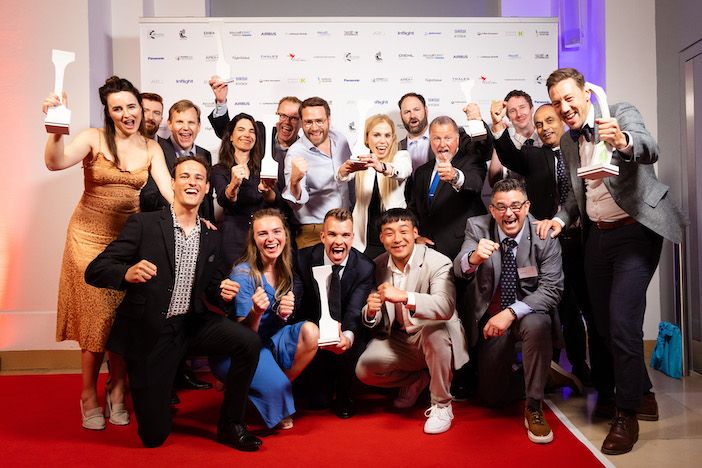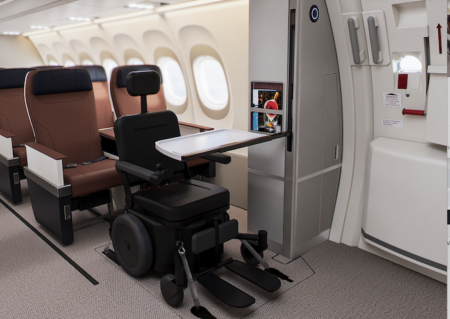The finalists in the Crystal Cabin Award, the world’s most prestigious recognition for innovation in aircraft interiors, have been announced. The awards cover important aspects of the air travel experience, including advancements in passenger comfort, efficiency, accessibility and sustainability, with the final contenders spanning major airlines, suppliers, manufacturers and design firms from around the world.
The 28-strong judging panel has voted on the shortlisted entries announced in December, to decide the finalists in each of the seven awards categories.
Cabin Technologies
There has been some streamlining and adjusting of categories for the 2025 awards, with a new category being Cabin Technologies, which recognises innovations in the areas of aircraft interior systems, components and materials, providing insights into the future of the aircraft cabin.
Collins Aerospace has made the final round with Galley.ai, an intelligent and connected technological ecosystem that optimises crew efficiency by streamlining galley management and enabling frictionless communication between crew and passengers via artificial intelligence.
Diehl Aviation is aiming to revolutionise cabin interiors with eDecor, a customisable, energy-efficient décor that enhances both airline brand presence and passenger comfort. The key is that aircraft operators can rapidly change the appearance of a cabin ‘on the fly’.
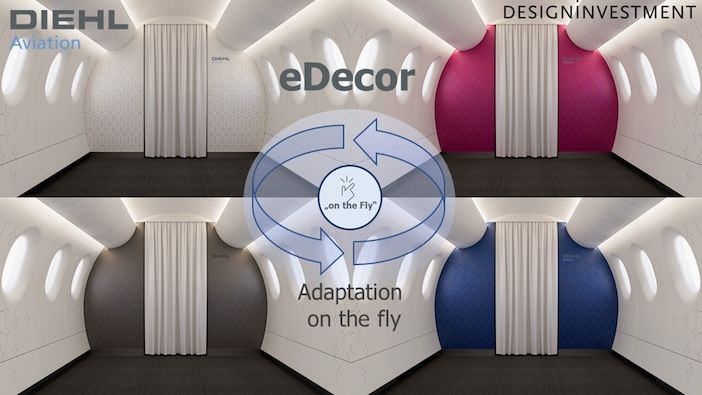
Invisible when not in use, Lufthansa Technik’s ‘Hidden TouchDisplay’ is a customisable touch panel that delivers an effortless user experience. The panel has a sleek, uncluttered look that integrates with any cabin design.
Judges Choice: Airline Innovation
Also new for the 2025 Crystal Cabin Award is a category that recognises the important role that airlines play in advancing the passenger experience ecosystem. Selecting from entries by four of the world’s leading airlines, the judging panel will be asked to honour one innovation with a special Judges’ Choice award. The four airline innovations up for consideration were submitted by Air France, Air India, Cathay Pacific and United Airlines.
Air France is in the running with the new cabins for its Embraer 190 single-aisle aircraft. The cabin, due to enter into service in early 2025, features new leather-trimmed seats from French manufacturer Expliseat that are 30% lighter than the airline’s current E190 seat model, helping save fuel.
Air India’s entry is Vista, an inflight entertainment (IFE) system designed to prioritise the personal needs of the customer and offer a connected and immersive experience above the clouds.
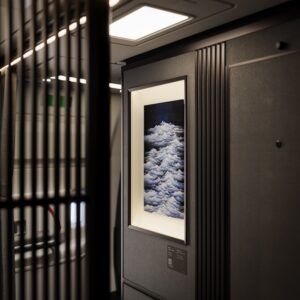
‘Gallery In The Skies’ by Cathay Pacific puts unique works of art into bespoke gallery spaces onboard its Boeing 777-300ER aircraft. These unique design features create an inspiring art viewing experience in the air.
United Airlines is competing with ‘United’s Onboard Digital Experience’, a new digital platform centred on delivering a personalised experience and relevant information to enable customers to feel informed, at ease and in control of their travel experience on over. The systems will be available on more than 1,000 United aircraft.
Passenger Comfort
The innovations in this category are all designed to create a relaxed, enjoyable and care-free experience for air passengers.
The Airbus ‘A220 Airspace Cabin’ extends the airframer’s Airspace cabin concept to the smallest member of its commercial airliner fleet, giving a more spacious feel to smaller aircraft. Features include XL overhead stowage bins, special Airspace cabin lighting designs, and improved power supply provision for passengers’ devices.
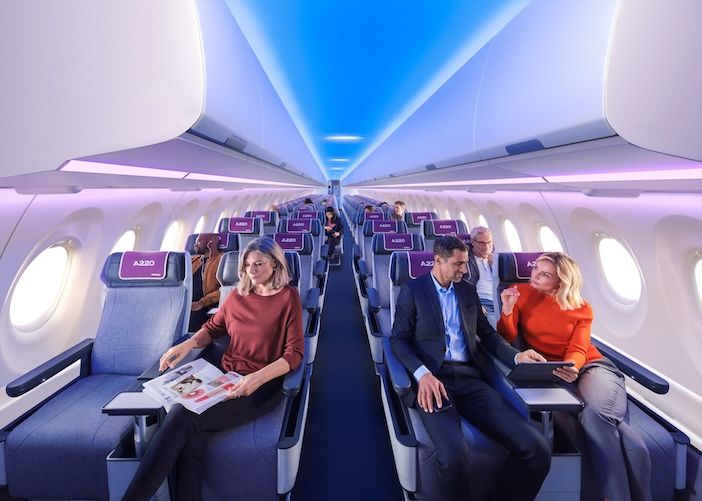
Cathay Pacific, JPA Design and Reaktor collaborated to integrate more functionality into the IFEC system of its Aria Suite (business class). The ‘IFEC: In-Flight Entertainment &Control’ system gives passengers control over many functions, directly within the interface of the entertainment system.
Long-haul ergonomics are addressed by Comfort Motion Global’s ‘Healthy Motion Seating’. This software proactively makes subtle adjustments to positions of seats fitted with electric motors in order to reduce fatigue and discomfort on long-distance journeys.
IFEC and Digital Services
Seamless connectivity and personalised entertainment content delivery have become key drivers of passengers’ perception of service quality on their journey.
 Focussed on the needs of VIP passengers travelling on Boeing 737s, Lufthansa Technik, Satcom Direct and IDAIR have collaborated to create ‘Triple Innovation For A Five Star Cabin Experience’. The triple innovations in question are a combination of a low-drag, tail fin-mounted radome, an electronically steered LEO antenna, and an integrated content delivery system designed to maximise operational effectiveness, project value, and the user experience.
Focussed on the needs of VIP passengers travelling on Boeing 737s, Lufthansa Technik, Satcom Direct and IDAIR have collaborated to create ‘Triple Innovation For A Five Star Cabin Experience’. The triple innovations in question are a combination of a low-drag, tail fin-mounted radome, an electronically steered LEO antenna, and an integrated content delivery system designed to maximise operational effectiveness, project value, and the user experience.
Safran Cabin is competing with ‘Safran Connected Interiors’. Using internet-of-things (IoT) technology, the system autonomously captures and transfers operational data across cabin equipment to provide a fully digitalised, retrofit-ready maintenance solution.
Thales Avionics’ entry, 360Stream, is designed to provide the same standard of seamless content delivery we experience on the ground. 360Stream provides access to live content and – for the first time – offers Digital Video Recording (DVR) capability, as well as near-live updates and highlights of live events.
Sustainable Cabin
Sustainability is a key area of innovation for the Crystal Cabin Award, recognising an industry-wide movement towards lowering emissions, reducing waste, and introducing circularity into processes and products.
Boeing, Adient Aerospace, Botany Weaving and LanzaTech have teamed up for a project named ‘From Waste Carbon to Cabin Comfort: Bringing Circularity to Aircraft Textiles’. Using carbon capture technology, the system transforms carbon emissions into sustainable fabric for the aircraft interiors industry, providing multiple ways of reducing the environmental footprint of textile production.
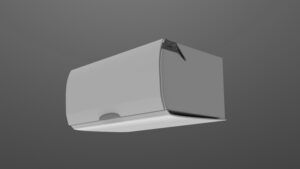
Diehl Aviation has chosen to concentrate on materials circularity for its 2025 entry, the Eco Bin. Billed as the world’s first fully recyclable overhead stowage compartment, the bin design features a specially developed recyclable sandwich material and reduces environmental impact by saving weight and CO2 emissions.
The third finalist is Unum Aircraft Seating, which has been working on ‘Ecoprint Refoam’, a material that utilises additive-manufacturing techniques to create a lightweight, recyclable replacement for traditional polyurethane foam stacks in aircraft seating.
Accessibility
Ensuring that everyone, including wheelchair users, enjoys the same quality of air travel has become an area of growing focus within the aviation industry. To reflect this important trend, the Crystal Cabin Awards now has a dedicated Accessibility category.
Cathay Pacific has reached the final with an innovation to make its Aria Suite business-class seat more accessible for wheelchair users. The Seamless Accessibility concept integrates a movable ‘garage’ for the suite door that has been specifically created to make transitioning from a wheelchair into a passenger seat easier.
Collins Aerospace’s entry, Prime+, is a cabin platform system that enables wheelchair users to fly while seated in their own wheelchairs, completely removing the need to move from a wheelchair to an aircraft seat.
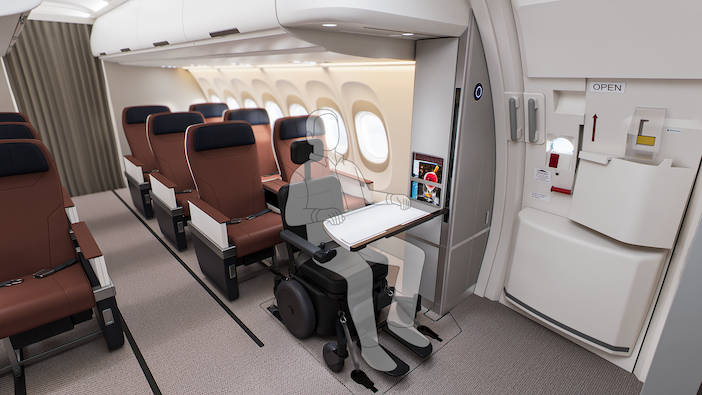
The third contender is Space³ by Diehl Aviation, which adopts a flexible approach to accommodating wheelchair users in aircraft lavatory areas. The design incorporates several features such as foldable doors and sinks, while also saving up to 80kg of weight.
University
The university category of the Crystal Cabin Award is always a hotbed of innovation, with university students creating some new viewpoints.
A team from Hamburg University of Applied Sciences (HAW) cooperated with Diehl Aviation on ‘Single Aisle Lavatory Door 1 – Accessibility for all’. The concept is designed to enhance accessibility for passengers with reduced mobility on single-aisle aircraft, enabling them to use the lavatory space more comfortably and independently. The lavatory area features a spacious layout that accommodates an onboard wheelchair and provides sufficient room for a support person, ensuring dignity and ease of use.

The ‘Ultra-lightweight Display System’ by students from Tongji University in cooperation with Boeing, leverages miniature projectors and gesture recognition technology to deliver a new in-flight entertainment system experience for both airlines and passengers. Each projector can use surfaces like seatbacks, tray tables, windows and cabin partitions to display flight information or video content.
Students from UDIT Universidad de Diseño, Innovación y Tecnología in Madrid, in cooperation with Iberia, have entered R.A.I.S.S. (Restroom Autonomous In-flight Sanitising System). This robotic system cleans the lavatory floor after each use, and incorporates additional highlights such as an interactive screen, an island-format sink, and a self-cleaning toilet system.
So what happens next?
The finalists will have the opportunity to present their concepts in person to the judging panel during a special event at Aircraft Interiors Expo in Hamburg (8-10 April 2025). The panel will then decide the winners of the 2025 Crystal Cabin Awards, which will be announced on the evening of 8th April at a gala dinner at the Grand Elysee Hamburg hotel.


